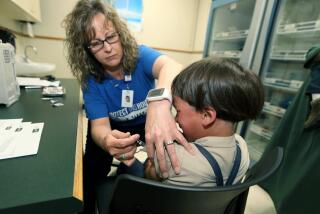Investing in the World’s Children
- Share via
A surge of immunization programs in Asia, Africa and Latin America saved the lives of an estimated 800,000 children last year, the United Nations Children’s Fund (UNICEF) disclosed in its annual State of the World’s Children report on Wednesday. The growing use of another element of the UNICEF program, oral rehydration therapy to treat victims of diarrheal disease, boosted the number of lives saved to well over a million.
But immunization is still available only to less than half the world’s children. Two million will die of measles alone this year because vaccination was not available to them. And an estimated 80% of the families in the Third World remain ignorant of the life-saving effectiveness of oral rehydration therapy.
Universal immunization is the focus of the 1986 report as the organization increases efforts to vaccinate all the world’s children by 1990. In addition, the report adds a new element to the UNICEF child-survival campaign: Vitamin A. New research has indicated its extraordinary effectiveness in reducing child death rates, in addition to the previously understood importance in terms of protecting the children’s eyesight.
The release of the report coincided with new moves in the U.S. Congress to increase the American contributions to these programs. Congress will decide today on a proposal to add $25 million to the Child Survival Fund created by Congress two years ago, bringing it this year to $75 million. Legislation was introduced Tuesday to add $50 million in new funds next year for the immunization program. The nutrition aid program already has $8 million for Vitamin A.
Congress, on a bipartisan basis, has continued to give substantial support to UNICEF directly, rejecting for each of the last three years efforts of the Reagan Administration to cut the UNICEF contribution. This year Congress has appropriated $51 million for UNICEF, almost double what the President had proposed.
Government support is critically important for the organization. But, unlike most other development programs, UNICEF is also supported by individual private contributions and from the public sale of greeting cards. Unfortunately, a confusion of names has reduced public support in the United States. Some persons have confused UNICEF with UNESCO, another U.N. specialized agency from which the United States withdrew a year ago in a controversy over politicization of the organization and bad management.
Support for UNICEF and the programs that it has sponsored has proved to be a wise investment. There may be no more cost-effective use of development assistance.
More to Read
Sign up for Essential California
The most important California stories and recommendations in your inbox every morning.
You may occasionally receive promotional content from the Los Angeles Times.













